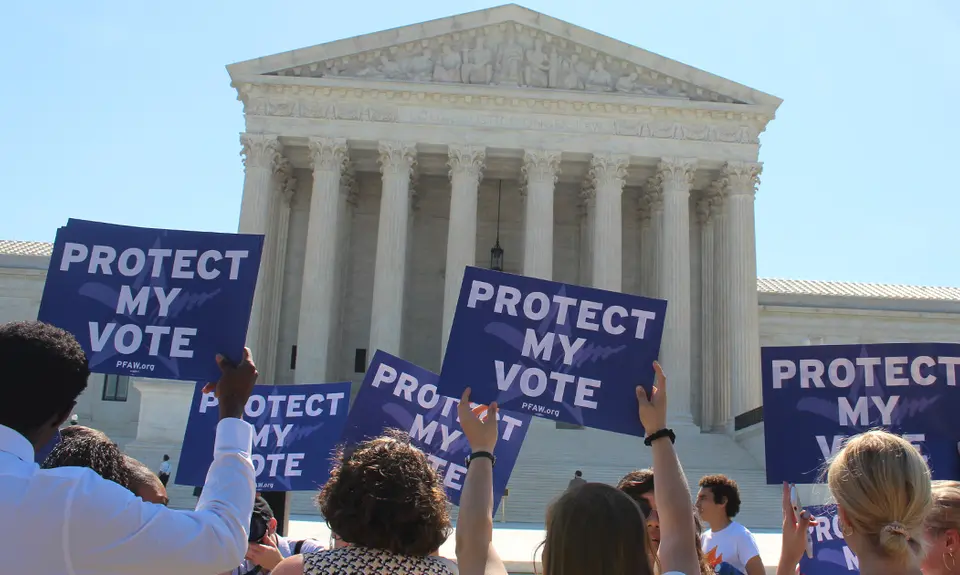Right now, our democracy is under threat. The public health crisis of COVID-19 is unlike any challenge to our election systems that we’ve ever seen. States need adequate funding to implement serious voting procedure reforms right away, not only for the remaining Democratic primaries, but also for the general election in November. Wisconsin’s chaotic April primary is a stark example of why we must take action now.
In partnership with the Declaration for American Democracy (DFAD) and its 150 member organizations, People For the American Way helped to launch the “Protect Our Vote: Defending Democracy During COVID-19” virtual town hall series on Monday, April 20. Hosted by DFAD’s Jana Morgan, the town hall’s presenters included PFAW Senior Campaigns Manager Rio Tazewell along with members of Congress and other guest speakers and civil society experts to discuss the voting rights initiatives that organizations as well as individuals must advocate for to ensure that our elections are safe, fair, and accessible.
Starting off the discussion, Sen. Amy Klobuchar, D-Minn, described what it was like to watch her husband suffer during a difficult fight with coronavirus himself, and how that clarified for her some of the harsh realitiesAmericans are struggling with during this crisis. The fact that the health care workers who are risking their lives every day to care for people like her husband might face further obstacles at the polls is unacceptable, Klobuchar said. Sen. Ron Wyden, D-Ore., noted that he and Klobuchar did not reinvent the wheel in writing their bill, the National Disaster and Emergency Ballot Act (NDEBA); these kinds of reforms have already been happening in states such as Nebraska, Oregon, and Washington. While the details of those efforts differ by state, they share a common thread: expanding voting methods to ensure that all registered voters, including vulnerable populations, are able to vote.
“Voting is the beating heart of our democracy,” said Sen. Elizabeth Warren, D-Mass., and yet it has somehow turned into a partisan issue. Republicans’ appalling efforts to block expanded voting are attempts to destroy our democracy, she said. Warren called for greater accountability from our country’s leadership on protecting our voting rights. Additionally, Warren called attention to the need to secure funding for the U.S. Postal Service, as well as the fact that voting by mail is not a perfect solution to every barrier to voting. We need well-rounded solutions that include vote by mail, early voting, expanded registration options, and greater in-person polling safety measures, among other initiatives called for in the $4 billion election protection package.
U.S. Representative Hakeem Jeffries, D-N.Y., described the difficulties his constituents in Brooklyn have faced as part of the epicenter of the pandemic in America. Jeffries said it’s unfathomable that his counterparts on the other side of the aisle in Congress want to make it harder to vote in a crisis. He and his Democratic colleagues are committed to securing the funding necessary to ensure that every single state and territory can fully implement these additional election measures before the November election.
This November will mark the eighth presidential election that Washington Secretary of State Kim Wyman, R-Wash., has experienced as an elections official, and she said that although this pandemic poses unique challenges in so many ways, it’s not something that should hinder voting. Ensuring election protections is not about partisanship, she explained, but solely about providing Americans with the confidence that voting is safe, fair, and accessible by all.
Vanita Gupta, president of the Leadership Conference on Civil and Human Rights, and Michelle Bishop, voting rights specialist at the National Disability Rights Network, also described the historic and systemic challenges to voting that many people already face. They both stressed that although voting rights advocates have made some progress in recent years, there is a lot more to be done, and the proposed funding in the upcoming coronavirus relief package is critical to ameliorate some of those challenges.
Tazewell spoke further on the importance of grassroots mobilization in the fight to expand election security funding. Echoing Warren’s call for people to get involved digitally, he encouraged people to join online actions and other events during this critical time. Brett Edkins from Stand Up America and Christine Wood from Public Citizen shared other ways to take an active role in protecting our right to vote, including calling members of Congress or writing officials hand-written letters.
Our fundamental right to vote must be protected during this crisis, and alternative measures must be put in place now to ensure that every registered voter has a means to participate in our democracy. In the coming weeks, keep an eye on PFAW’s social media channels to support these efforts.
